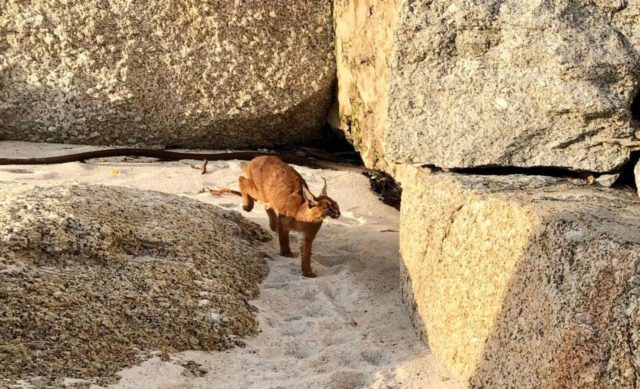Clifton resident was lucky and quick enough to spot a caracal walking along Clifton 1st beach, just below San Michele during an evening sunset.
Cape Town – A Clifton resident was lucky and quick enough to spot a caracal walking along Clifton 1st beach, just below San Michele during an evening sunset.
Caracals, also known as a ‘rooikat’ or ‘lynx, are elusive animals and they are known for their striking medium-sized cat with long powerful legs, large paws, a short tail and ear tips with long hair tufts.
A resident spotted the caracal, and was able to record it as it was moving along the beach shore.
There were also pictures captured by Steve Leslie, which can be seen below, and the footprints that it left in the sand:
According to the Urban Caracal Project, they are the largest carnivore on the Cape Peninsula.
“Caracals, like most cats, are curious animals, and while they do not per se like developed areas, young ones, especially, are too curious not too occasionally explore areas with a lot of human activity.”
These animals are however are under threat with vehicles, rat poison and urbanisation being some of the factors that contribute to the dwindling caracal numbers.
Video supplied via ANA
A graph by Urban Caracal Project shows that over the last five years, there have been 83 caracal mortalities.
“We collect the bodies of caracals that die in the Cape Peninsula, but also in and around other parts of Cape Town and its suburbs, including northern suburbs and as far north as West Coast National Park, and eastern suburbs and Stellenbosch, ” said the research group.
“Undoubtedly our data are biased towards vehicle mortalities, as those are the easiest to see and find. There are likely many more deaths than we collect data on, particularly for caracals killed by disease, pesticides, poaching, and even caracals killing other caracals.”
Cape Argus








